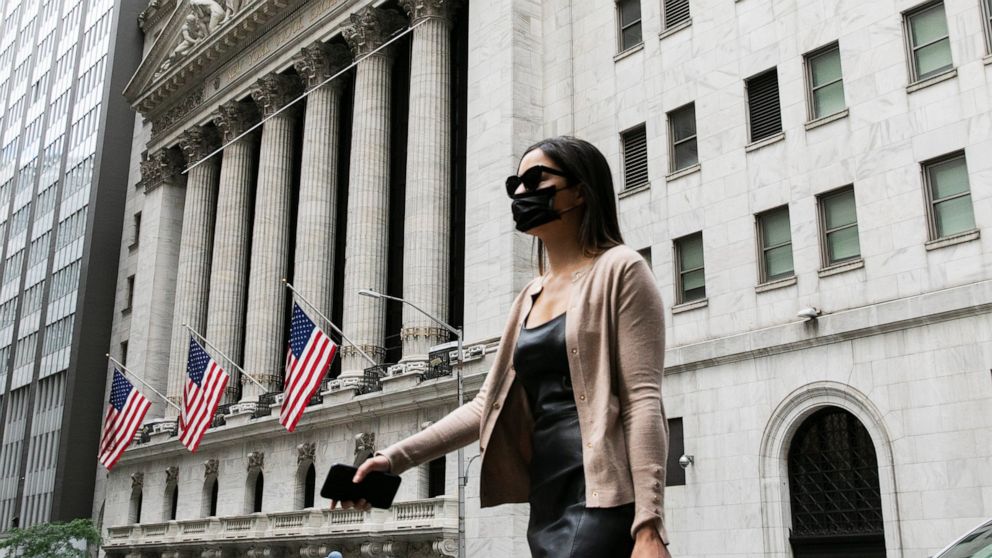Stocks fall back after closing out best quarter in years
Global shares are mostly lower after major indexes closed out their best quarter in years
By
YURI KAGEYAMA AP Business Writer
July 1, 2020, 11:40 AM
4 min read
4 min read
TOKYO — Global shares mostly dipped on Wednesday, with investors seemingly more cautious after major indexes closed out their best quarter in years.
The second quarter gains were the best since 1998 for Wall Street and the largest since 2015 for Europe as hopes for an easing of economic lockdowns spurred market confidence. But a resurgence in COVID-19 cases in some countries, particularly the United States, is tempering that optimism.
France’s CAC 40 fell 1.6% to 4,838 while Germany’s DAX shed 1.5% to 12,124. Britain’s FTSE 100 was 1.3% lower at 6,088. U.S. shares were set to drift lower with Dow futures down 0.9% and S&P 500 futures down 0.6%.
Japan’s benchmark Nikkei 225 slipped nearly 0.8% to finish at 22,121.73. South Korea’s Kospi inched down nearly 0.1% to 22,121.73. Australia’s S&P ASX 200 gained 0.6% to 5,934.40. The Shanghai Composite rose 1.4% to 3,025.98, while trading was closed in Hong Kong for a holiday.
Economic indicators were mixed on Wednesday, with a quarterly Bank of Japan survey showing manufacturers’ sentiment plunged to its lowest level in more than a decade, as the pandemic crushes exports and tourism, mainstays for the world’s third largest economy.
A separate survey showed China’s manufacturing activity improved in June, adding to signs of a gradual recovery from the country’s deepest economic downturn since at least the mid-1960s.
The Chinese economy has been recovering but only slowly since global demand for exports is weak and consumers and businesses inside China are wary of further outbreaks and other risks from the pandemic.
A similar survey for the 19-country eurozone showed an improvement in manufacturing in June, with the industry almost growing again after widespread shutdowns. Analysts said that while the data pointed in the right direction, it shows that an economic recovery from the pandemic will be slow.
The disconnect between the surging stock markets and the dire realities of economies slammed by the pandemic and social distancing restrictions suggests investors are counting on a recovery they only assume is on the way, said Hayaki Narita at Mizuho Bank in Singapore. Ample cash thanks to massive stimulus from central banks has helped fuel the rallies.
“In other words, equity market bulls, as defined by the overwhelming rebound from March troughs, are looking past the current economic gloom despite not being out of the woods, and being emboldened by the flood of ultra-cheap money,” he said.
The surge in confirmed new cases, which has prompted the European Union to bar U.S. travelers from entry, is seeding doubts that the economic recovery can happen as quickly as markets had forecast. That helps explain why the market’s momentum cooled somewhat in June.
Beyond the coronavirus, analysts also point to the upcoming U.S. elections and other risks that could upset markets. If Democrats sweep Congress and the White House, which many investors see as at least possible, it could mean higher tax rates, which could weaken corporate profits.
Benchmark U.S. crude gained 78 cents to $40.05 a barrel. It slid 43 cents to $39.27 a barrel on Tuesday, still nearly double where it was at the end of the first quarter. Brent crude rose 79 cents to $42.06 a barrel.
The dollar fell to 107.53 Japanese yen from 107.93 yen. The euro inched down to $1.1185 from $1.1236.
———
AP Business Writer Joe McDonald in Beijing contributed.
![]()


